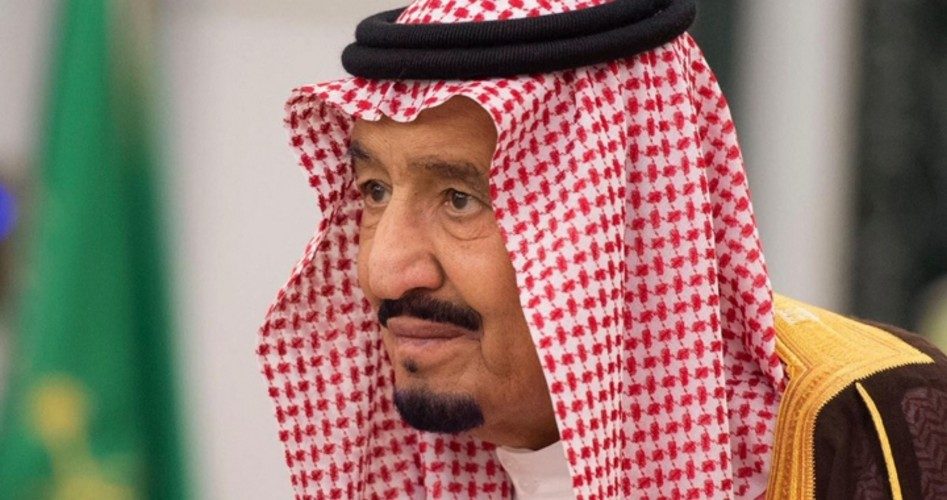
King Salman bin Abdul Aziz of Saudi Arabia (shown) issued a royal decree on November 4 that established an anti-corruption committee chaired by his son and heir to the throne, Crown Prince Muhammad bin Salman. Shortly afterwards, the Saudi press announced the arrest of the Saudi prince and billionaire Al-Waleed bin Talal, as well as more than 40 princes and government ministers on corruption and money laundering charges.
The committee, headed by the crown prince, has the authority to investigate, arrest, issue travel bans, and freeze the assets of those it finds corrupt.
Just prior to the arrests, King Salman removed Prince Miteb bin Abdullah from his post as head of the National Guard. The prince and his brother, Prince Turki bin Abdullah, who was once governor of Riyadh are reportedly among those who were detained. Both are sons of the late King Abdullah, who ruled before his half-brother King Salman rose to the throne.
The White House press secretary posted a new release on November 5 stating that President Trump had spoken with King Salman the previous day — the same day that the shakeup in Saudi Arabia occurred. However, the release did not mention anything about the Saudi king’s decree or the round of arrests that followed. It spoke only of King Salman’s expression of condolences for the recent terrorist attack in New York, as well as Trump’s expression of thanks to the king for his support and America’s commitment to defeating ISIS.
Trump also thanked the king for military purchases, including a $15 billion investment in Terminal High-Altitude Area Defense (THAAD) and billions more in commitments and investments. And he assured the king that he would support the purchase of appropriate military equipment that would keep Saudi Arabia safe and help create American jobs.
While Trump’s November 4 call to King Salman did not include any mention of the Saudi political upheaval, in a series of tweets late on November 6, he appeared to approve King Salman’s decision to establish the anti-corruption committee and the subsequent detentions.
“I have great confidence in King Salman and the Crown Prince of Saudi Arabia, they know exactly what they are doing,” Trump said in one tweet.
“Some of those they are harshly treating have been ‘milking’ their country for years!,” Trump claimed in another tweet.
Trump undoubtedly had Al-Waleed bin Talal in mind. The two engaged in a confrontational twitter campaign during Trump’s run for the White House. In 2015, Al-Waleed criticized Trump on Twitter for his rhetoric during the presidential campaign, calling him a “disgrace not only to the GOP but to all America” and urging him to drop out of the race.
In his response on Twtter, Trump ridiculed him, calling him a “dopey prince.” Trump’s tweets read: “Dopey Prince @Alwaleed_Talal wants to control our U.S. politicians with daddy’s money.” “Can’t do it when I get elected.”
However, two days after Trump was elected, Al-Waleed tried to reconcile with him, tweeting: “President elect @realDonaldTrump whatever the past differences, America has spoken, congratulations & best wishes for your presidency.”
Muhammad bin Salman has been a key figure in Saudi Arabia for months before he was placed at the head of the anti-corruption committee and has been described as the power behind the throne of his father, King Salman. He was appointed crown prince in June, following his father’s decision to remove Muhammad bin Nayef (the king’s nephew) from all of his positions, making the crown prince the heir apparent to the throne.
The November 4 New York Times report about the events noted:
The sweeping campaign of arrests appears to be the latest move to consolidate the power of Crown Prince Mohammed bin Salman, the favorite son and top adviser of King Salman. The king had decreed the creation of a powerful new anticorruption committee, headed by the crown prince, only hours before the committee ordered the arrests.
John Defterios, CNN’s emerging markets editor, who has covered Saudi Arabia since the 1990s, described the removal of several key figures in the Saudi government as part of the Mohammed bin Salman’s “top to bottom overhaul.”
“From literally his Vision 2030 plan, to social reforms with women driving, and as we see now the third leg of it, an aggressive push to root out corruption,” he said.
CNN reported that Defterios said there have long been concerns about corruption within Saudi Arabia.
“The correction in oil prices has changed the game they cannot afford to go business as usual as they have for the past 20 years,” he said.
“That’s the reason why they want to diversify the economy and also make a bold attempt to root out corruption.”
A Washington Post report noted that Mohammed bin Salman met President Trump in the Oval Office in March. During Trump’s visit to Saudi Arabia in May, Saudi leaders and Trump promoted deals to promote manufacturing in the kingdom, not just purchases of equipment from the United States.
Jared Kushner, the president’s adviser and son-in-law, made an unannounced visit to Riyadh last week, however it has not been made public what was discussed or if that meeting had any influence on the Saudi king’s decision to engage in wholesale house cleaning.
Photo of King Salman: AP Images
Related articles:
Saudi Arabia on UN’s Status of Women Panel
Saudi Arabia Losing Influence in Global Oil Markets
Saudi-U.S. Ties Strained by U.S. Foreign Policy in Middle East



